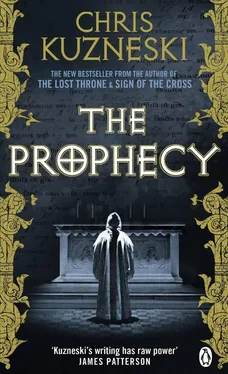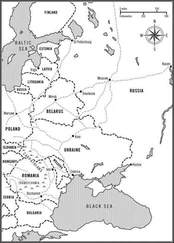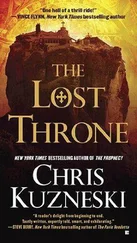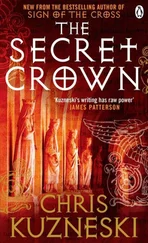Chris Kuzneski - The Prophecy
Здесь есть возможность читать онлайн «Chris Kuzneski - The Prophecy» весь текст электронной книги совершенно бесплатно (целиком полную версию без сокращений). В некоторых случаях можно слушать аудио, скачать через торрент в формате fb2 и присутствует краткое содержание. Жанр: Фантастика и фэнтези, на английском языке. Описание произведения, (предисловие) а так же отзывы посетителей доступны на портале библиотеки ЛибКат.
- Название:The Prophecy
- Автор:
- Жанр:
- Год:неизвестен
- ISBN:нет данных
- Рейтинг книги:4 / 5. Голосов: 1
-
Избранное:Добавить в избранное
- Отзывы:
-
Ваша оценка:
- 80
- 1
- 2
- 3
- 4
- 5
The Prophecy: краткое содержание, описание и аннотация
Предлагаем к чтению аннотацию, описание, краткое содержание или предисловие (зависит от того, что написал сам автор книги «The Prophecy»). Если вы не нашли необходимую информацию о книге — напишите в комментариях, мы постараемся отыскать её.
The Prophecy — читать онлайн бесплатно полную книгу (весь текст) целиком
Ниже представлен текст книги, разбитый по страницам. Система сохранения места последней прочитанной страницы, позволяет с удобством читать онлайн бесплатно книгу «The Prophecy», без необходимости каждый раз заново искать на чём Вы остановились. Поставьте закладку, и сможете в любой момент перейти на страницу, на которой закончили чтение.
Интервал:
Закладка:
‘Worry about them later. For now, concentrate on the hallways.’
‘Just so you know, she’s wearing jeans and a green coat. She should stand out.’
Payne nodded in agreement as he passed several older couples who were dressed in formal attire. ‘Remember, this is a charity event, and she’s done nothing wrong. Try not to shoot her.’
Jones grinned. ‘No promises.’
‘And no running. I don’t want anyone else to worry.’
Payne smirked and hung up the phone, which was one of the only ways to stop Jones’s yapping. Some of the others included duct tape and medical-grade pharmaceuticals, neither of which Payne had in his tuxedo.
Jones smiled in triumph when he heard the click of his phone. That meant Payne was unable to think of a suitable retort and had hung up instead.
Keeping his phone in his hand, Jones shifted his attention to his surroundings. This was the same corridor he had strolled down minutes before, so its layout was fresh in his head. The French Classroom was on his immediate left, followed by the Norwegian and the Russian. Up ahead on his right was the Syria — Lebanon Room he had viewed earlier. After that, the hallway split: stairs to the left, elevators to the right, and several regular classrooms in the distance. Rooms on the first floor were rarely locked, giving students a quiet place to study. Unfortunately, it also gave the woman plenty of places to hide.
At this point Jones viewed her more as a curiosity than a threat. He had jokingly referred to
On the other hand, her behaviour had raised a red flag.
And for that reason alone, they were determined to find her.
5
Bruges, Belgium
(60 miles north-west of Brussels)
François Dubois was a very bad man, who had impeccable taste.
Although he had been born into an upperclass family, his life of crime had started at an early age on the streets of Paris. During the week, Dubois had attended Lycée Louis-le-Grand (LLG), one of the best secondary schools in the city, known for alumni such as Victor Hugo, Jean-Paul Sartre, and Voltaire. On the weekend, he had run a gang that specialized in robbing tourists near the city’s biggest attractions. By the age of sixteen, Dubois had already killed three people.
Worst of all, he had enjoyed it.
Thirty years later, Dubois still had a taste for blood but preferred his minions to do the dirty work. That way, there was less of a chance of staining one of his custom-made suits. It also
However, Dubois had been detained and questioned more times than he could remember, especially in the early days when he was still laying the groundwork for his criminal empire. His interview sessions with the French authorities had happened so frequently he actually pencilled them into his weekly schedule. Of course, it helped that Dubois had many cops on his payroll who tipped him off ahead of time about impending interrogations.
That was one of the most important things he had learned early on: no matter how expensive, inside information was always priceless.
Over the years, Dubois had slowly realized something else about the criminal career he had chosen for himself. Even though he loved the culture and excitement of his home town, he knew his life would be cut short if he remained in Paris. Most of the cops recognized him, and so did many of the crooks. He knew he would
As a schoolboy at LLG, Dubois had watched a slideshow presentation on Bruges, the selfproclaimed Venice of the North, and had been captivated by its medieval charm. Later, when he finally had an opportunity to explore its scenic canals and historic Grand Square, he fell in love with the city. Although the pace was much slower than Paris, he felt at ease while walking the streets, something he was no longer able to do in France. Nevertheless, Dubois wasn’t reckless during his evening strolls. Bodyguards accompanied him wherever he went.
After making a financial killing on several arms deals in the mid-1990s, he bought a castle on the outskirts of Bruges, which he named Château Dubois. Then he travelled Europe in search of the perfect furnishings to adorn his home. Most men in his position would have hired a decorator to take care of such trivial tasks, but Dubois considered himself a new breed of criminal — classically educated, exquisitely dressed, and, above all else, culturally superior to all those round him.
Once again, it always came back to inside information for Dubois.
The more he acquired, the better off he would be.
Dressed in slacks and a cashmere sweater, Dubois read his notebook near a roaring fire in his study. A snifter of Armagnac and an encrypted phone sat next to him on a hand-carved table he had acquired at an auction house in Malta.
Much like his furniture, he was solidly built and well maintained. Neither short nor tall, he exercised just enough for his clothes to fit him properly. Broad shoulders and a thick chest showcased his tailored suits. His shoes were always polished, and his pants were always cuffed. His chestnut hair, tinged with a hint of grey near the ears, was always slicked back with an all-natural gel that he imported from the Orient. Last but
Despite all this pampering, which might suggest he was a little too familiar with his feminine side, Dubois was a raging heterosexual. To help quench his libido, he flew in female courtesans from all round the globe, sometimes partaking in several at once. Although he had a few personal favourites who were flown in monthly, that was as close as he came to having an actual relationship. For him, women were disposable, meant to be used and discarded like toothpicks.
Usually at this hour, some exotic beauty would be writhing on top of him in his bedroom, but due to a business concern in America, the fire and the alcohol were the only things keeping him warm. All told there were twelve fireplaces in his château, which had seemed like overkill until he moved in and realized how draughty a fourteenth-century castle could be. The temperature outside was in the low thirties — pretty typical for a December night in Belgium — but would warm up to the fifties during the day. Normally Dubois spent this time of year in his exquisite vacation homes, particularly the ones he owned near tropical beaches.
As an antiquarian book collector, Dubois possessed one of the finest rare-book collections in Europe. Recently, thanks to a very expensive bribe or two, he had been given new information about the mythical manuscript he had been dreaming about since he was a little boy. Although many historians doubted the book ever existed (they claimed it was the figment of someone’s overactive imagination), Dubois was confident it was real. In fact, he was so convinced he had learned several ancient languages just so he could read first-hand accounts of all the people who had searched for the book before him.
By learning about their failed attempts, he hoped to achieve success.
Thumbing through his notes on The First Face of the French Janus by Jean-Aimé de Chavigny, a sixteenth-century writer who had guided his search on multiple occasions, Dubois heard the phone ring. Glancing at his watch, he noted the time and approved. The call had been placed within the timeframe they had discussed.
Apparently, everything had gone as planned.
‘Hello,’ he said in Dutch. ‘Do you have news?’
Dubois shook his head, irritated. ‘You consider that news? That is not news. That is a waste of my time. I already knew about the leak. That’s why you were sent there in the first place. Call me back when the leak has been eliminated!’
6
Payne was known for his gut feelings. Sometimes they went against empirical evidence, and often they defied common sense. But he had learned long ago to trust his instincts, even if he couldn’t rationally explain them. Sometimes he just knew when something was wrong.
Читать дальшеИнтервал:
Закладка:
Похожие книги на «The Prophecy»
Представляем Вашему вниманию похожие книги на «The Prophecy» списком для выбора. Мы отобрали схожую по названию и смыслу литературу в надежде предоставить читателям больше вариантов отыскать новые, интересные, ещё непрочитанные произведения.
Обсуждение, отзывы о книге «The Prophecy» и просто собственные мнения читателей. Оставьте ваши комментарии, напишите, что Вы думаете о произведении, его смысле или главных героях. Укажите что конкретно понравилось, а что нет, и почему Вы так считаете.












